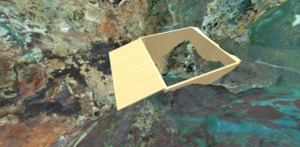Difference between revisions of "Volumetric Regimes"
m |
|||
| Line 1: | Line 1: | ||
[[File:ROCKREPO01.png|thumb]] | [[File:ROCKREPO01.png|thumb]] | ||
| − | Volumetric Regimes: material cultures of quantified presence | + | == Volumetric Regimes: material cultures of quantified presence == |
Edited by Possible Bodies (Jara Rocha and Femke Snelting) | Edited by Possible Bodies (Jara Rocha and Femke Snelting) | ||
Volumetric Regimes emerges from Possible Bodies, a collaborative project on the intersection between artistic and academic research. The project was initiated in 2016 to explore the very concrete and at the same time complex and fictional entities of so-called "bodies" in the context of 3D computation. Possible Bodies developed alongside an inventory of cases [1] and resulted in texts, workshops, visual essays and performances. This book would bring together diverse materials from an ongoing conversation between artists, software developers and theorists working with the techniques and technologies of detecting, tracking, printing, modelling and rendering. | Volumetric Regimes emerges from Possible Bodies, a collaborative project on the intersection between artistic and academic research. The project was initiated in 2016 to explore the very concrete and at the same time complex and fictional entities of so-called "bodies" in the context of 3D computation. Possible Bodies developed alongside an inventory of cases [1] and resulted in texts, workshops, visual essays and performances. This book would bring together diverse materials from an ongoing conversation between artists, software developers and theorists working with the techniques and technologies of detecting, tracking, printing, modelling and rendering. | ||
| − | + | The book will be organised in five chapters, each containing differently formatted materials. Each chapter starts with a commissioned contribution which addresses the material-discursive entanglements that emerge from the crossing of quite differentiated worldlings. Contributors include: Ramon Amaro, Maria Dada, Helen Pritchard, Nicolas Malevé. | |
| − | + | [[More|About]] | |
| − | |||
| − | |||
somatopologies: On the ongoing rendering of corpo-realities | somatopologies: On the ongoing rendering of corpo-realities | ||
Revision as of 09:10, 27 March 2020
Volumetric Regimes: material cultures of quantified presence
Edited by Possible Bodies (Jara Rocha and Femke Snelting)
Volumetric Regimes emerges from Possible Bodies, a collaborative project on the intersection between artistic and academic research. The project was initiated in 2016 to explore the very concrete and at the same time complex and fictional entities of so-called "bodies" in the context of 3D computation. Possible Bodies developed alongside an inventory of cases [1] and resulted in texts, workshops, visual essays and performances. This book would bring together diverse materials from an ongoing conversation between artists, software developers and theorists working with the techniques and technologies of detecting, tracking, printing, modelling and rendering.
The book will be organised in five chapters, each containing differently formatted materials. Each chapter starts with a commissioned contribution which addresses the material-discursive entanglements that emerge from the crossing of quite differentiated worldlings. Contributors include: Ramon Amaro, Maria Dada, Helen Pritchard, Nicolas Malevé.
somatopologies: On the ongoing rendering of corpo-realities
Signs of clandestine disorder: The continuous after-math of 3D computationalism
x, y, z: Dimensional axes of power
Parametric unknowns: Hypercomputation between the probable and the possible
Depths and densities: Accidented and dissonant spacetimes
The conversations brought together in Volumetric Regimes were fed by and fed into various institutions and publications internationally, such as Goldsmiths Digital Arts Computing (Volumetric Ecologies, London), Hangar (Imagined Mishearings, Barcelona), BAK/Centre for the Humanities (Posthuman Glossary, Utrecht), La Gaîté Lyrique (Computer grrrls, Paris), UdK (How to Relate, Berlin), Schloss Solitude (Collective inventorying, Stuttgart), Universidad de la República de Uruguay (Naturoculturas Turbocapitalistas, Montevideo), Transmediale (Depths and Densities, Berlin) and La Casa Encendida (Bug Reporting, Madrid).
Acknowledging the licenses of the included material, the book will be made available as Open Access.
